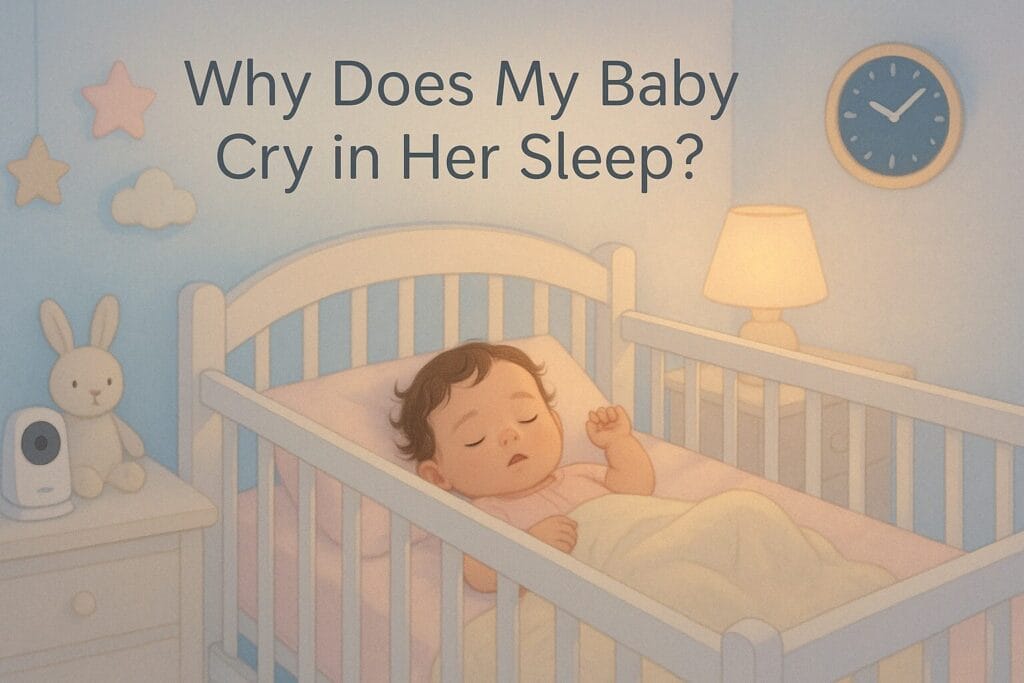As a new parent, hearing your baby cry in her sleep can be unsettling. You may ask yourself, “Why does my baby cry in her sleep?” or “Why does my baby keep crying in her sleep?” It’s normal to feel concerned when your baby suddenly cries out during the night, especially when it disrupts her sleep. Many parents are left wondering, “Why does my baby randomly cry in her sleep?” or “Why does my 3-month baby cry in her sleep?” Understanding the reasons behind your baby’s sleep crying is crucial for ensuring she sleeps more peacefully, and for alleviating any discomfort she may be experiencing.
In this article, we’ll explore the most common reasons why does my baby cry in her sleep, provide tips on how to handle the situation, and offer reassurance that sleep crying is a common phase many babies go through.
Table of Contents
Why Does My Baby Cry in Her Sleep? Common Causes Explained
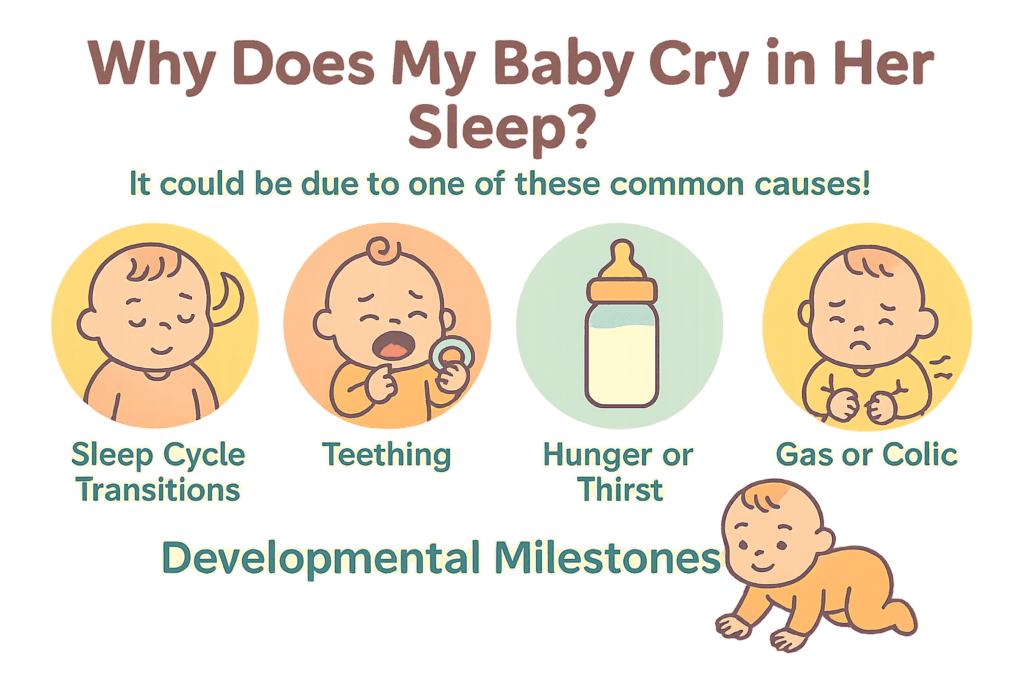
It’s important to recognize that babies cry for many reasons, even when they are sleeping. Why does my baby cry in her sleep can be due to several factors, from normal developmental stages to temporary discomfort. Let’s dive into the common causes of crying during sleep and help you understand what might be causing your baby’s distress.
1. Sleep Cycle Transitions

One of the main reasons why does my baby cry in her sleep is due to the natural transition between sleep cycles. Babies, especially younger ones, have shorter sleep cycles than adults, with frequent shifts between deep sleep and light sleep. During these transitions, babies can wake up briefly, cry, or appear restless.
- Why does my baby cry out in her sleep? Babies often cry when they experience these lighter stages of sleep, as they have not yet learned to self-soothe. This is a common phenomenon and usually doesn’t last long.
- Why does my 3-month baby cry in her sleep? At 3 months, your baby’s sleep cycle becomes more structured, and light sleep stages increase. As a result, your baby may cry during transitions from deeper sleep to lighter stages.
2. Developmental Milestones
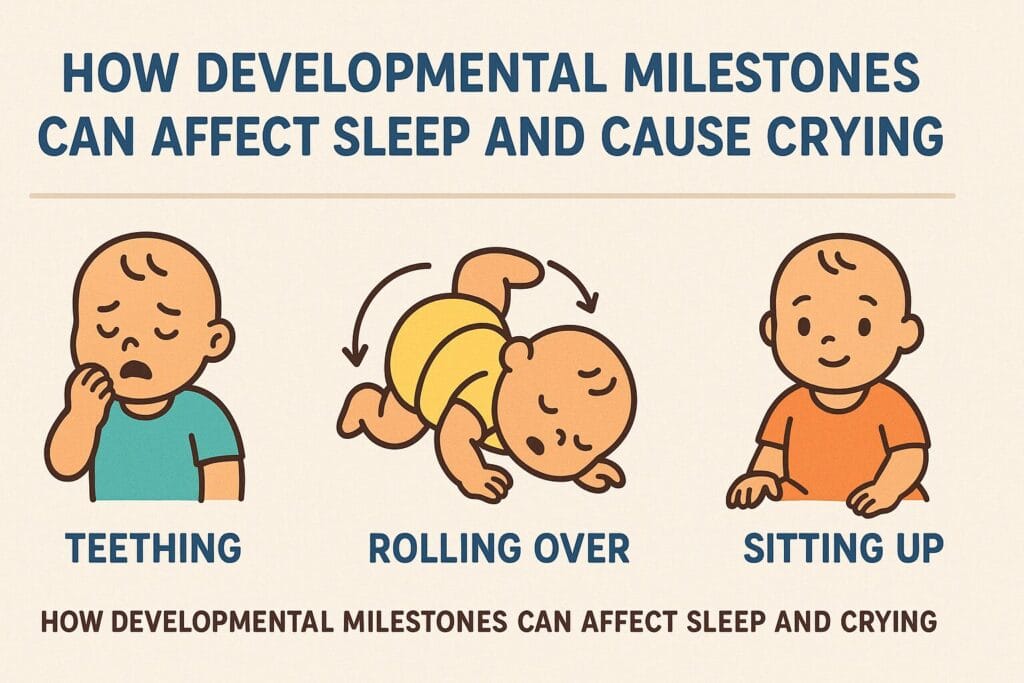
As babies grow and develop new skills, it’s not uncommon for them to experience sleep disruptions. Developmental milestones such as teething, learning to roll over, or even the onset of separation anxiety can contribute to nighttime crying.
- Why does my baby keep crying in her sleep? Developmental milestones often bring discomfort, especially teething or motor skill development, which can cause your baby to cry in her sleep due to physical or emotional discomfort.
- Why does my baby randomly cry in her sleep? It’s possible that your baby is processing new experiences or physical changes that affect her sleep. These milestones are typically temporary and will pass with time.
3. Hunger or Thirst
Babies, particularly under 6 months, require frequent feedings, even during the night. If your baby is waking up crying during her sleep, it could be because she is hungry or thirsty. Why does my baby cry in her sleep might simply be because she needs to feed.
- Why does my 3-month baby cry in her sleep? At three months, babies may still need nighttime feedings to stay full and comfortable. If your baby has been asleep for a few hours, she might wake up crying from hunger.
4. Discomfort or Illness
Discomfort, such as a wet diaper, being too hot or cold, or even an illness like a cold or ear infection, can cause babies to cry during sleep. Why does my baby cry out in her sleep could be linked to physical discomfort.
- Why does my baby keep crying in her sleep? If your baby seems to cry out suddenly, it might be due to gas, colic, or a tummy ache. Babies may also cry during sleep if they’re feeling unwell and can’t communicate their discomfort.
5. Nightmares or Night Terrors
Though it may sound surprising, babies can start experiencing vivid dreams or night terrors at a young age. Why does my baby cry in her sleep could be due to these dreams, especially as her cognitive abilities develop around 6 months.
- Why does my baby randomly cry in her sleep? Nightmares or the beginnings of sleep disturbances during REM sleep can lead to crying out. This is a normal developmental phase and doesn’t usually last long.
6. Separation Anxiety
At around 6 to 9 months, many babies experience separation anxiety, but some babies can start feeling insecure as early as 3 months. Why does my baby cry out in her sleep? This could be a sign that she’s missing the comfort and reassurance of being close to you, even if she’s asleep.
- Why does my baby cry in her sleep? If your baby is experiencing separation anxiety, she may cry when she wakes up and realizes she’s not close to you, even if she was already asleep.
Is your baby waking up screaming from naps? Discover 5 easy solutions to help your baby wake up calm and rested, ensuring better sleep for both of you
How to Address and Manage Baby’s Crying During Sleep
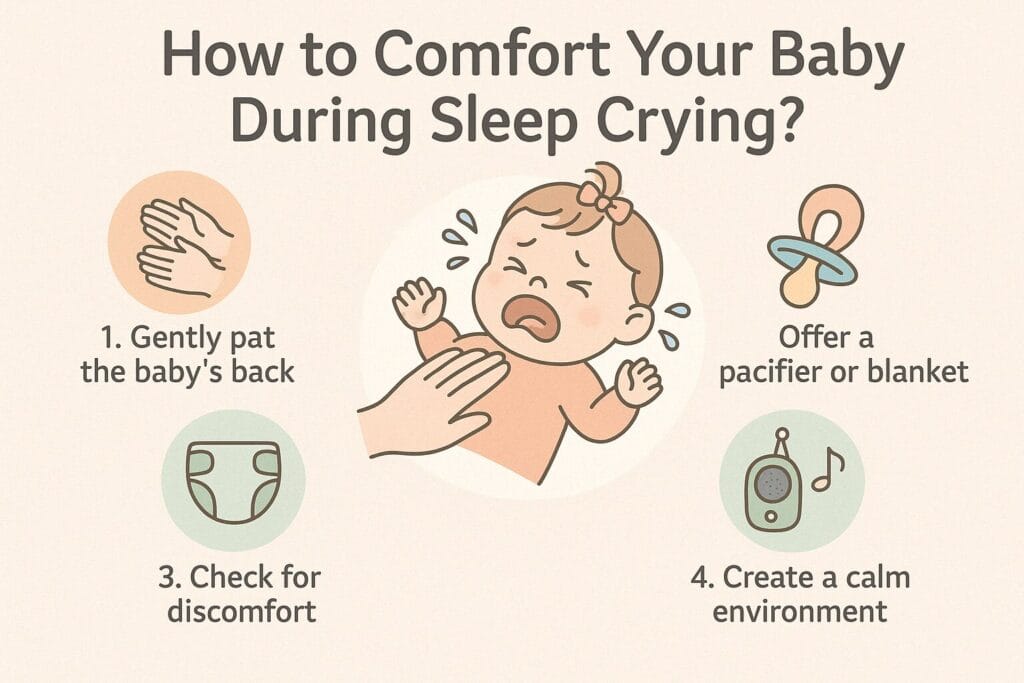
Once you understand why does my baby cry in her sleep, it’s time to explore ways to manage and reduce the crying. Here are some tips to help you and your baby get better rest:
1. Establish a Consistent Bedtime Routine
A soothing bedtime routine is crucial for helping your baby feel secure and ready to sleep. Why does my baby keep crying in her sleep? It could be because she’s unsettled at bedtime. By creating a calming routine, you can help your baby associate these actions with rest.
- Why does my baby cry in her sleep? A calming bedtime routine, such as a warm bath, gentle rocking, or reading a book, can help signal to your baby that it’s time to sleep, reducing anxiety and promoting longer periods of rest.
2. Offer Comfort and Reassurance
When your baby starts crying during sleep, offer comfort by gently patting her back, speaking softly, or offering a pacifier. Why does my 3-month-old baby cry in her sleep? She might still be in the early stages of learning how to self-soothe, so offering gentle reassurance will help her feel more secure.
3. Ensure a Comfortable Sleep Environment
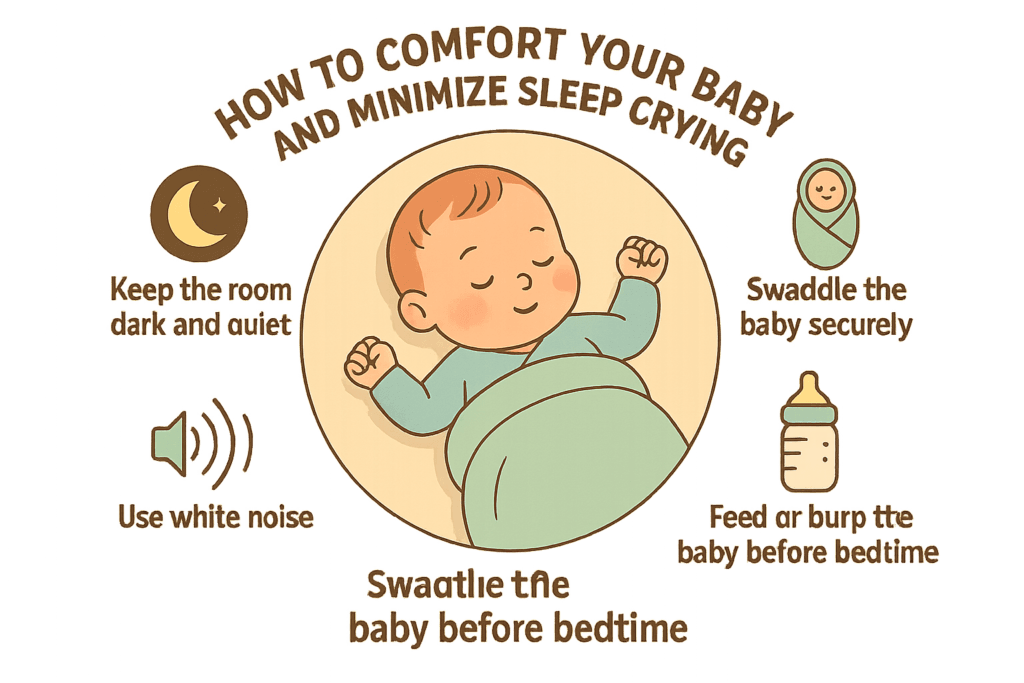
A comfortable sleep environment can make a significant difference in reducing crying during sleep. Keep the room dark, quiet, and at a comfortable temperature (68°F to 72°F). You may also want to use a white noise machine to help soothe your baby back to sleep.
Concerned your baby might be too hot while sleeping? Learn how to recognize the signs and follow safe sleep practices for your baby’s comfort and well-being.
4. Address Discomfort or Illness
Make sure your baby isn’t experiencing discomfort, such as a wet diaper, being too warm or cold, or gas. Why does my baby cry out in her sleep? It could simply be that she is uncomfortable. Changing her diaper or adjusting her clothing might be all she needs to go back to sleep.
5. Offer Night Feedings if Necessary
For babies under 6 months, hunger is a common cause of waking and crying during the night. Why does my baby cry in her sleep? If your baby is waking up from hunger, offering a nighttime feed may be the solution.
6. Create a Safe and Soothing Sleep Space
Ensure that your baby’s crib or bassinet is free of any soft objects or bedding that could pose a suffocation hazard. Why does my baby cry in her sleep? It might be due to discomfort from soft bedding or unsafe sleeping conditions.
When to Call the Doctor
If your baby’s crying persists or seems excessive, or if you notice any signs of illness such as fever, difficulty breathing, or vomiting, it’s important to consult with your pediatrician. Why does my baby randomly cry in her sleep? If the crying is persistent and not due to normal sleep cycles or hunger, your pediatrician can help determine if there’s an underlying issue that needs addressing.
FAQS
1. Why does my baby cry in her sleep?
Why does my baby cry in her sleep is a common question among parents. Babies cry in their sleep due to a variety of reasons, including sleep cycle transitions, developmental milestones like teething, discomfort, or hunger. As babies go through REM sleep, which is lighter, they may cry briefly as they transition between sleep stages. This is usually temporary and resolves on its own.
2. Why does my baby keep crying in her sleep?
If you’re wondering why does my baby keep crying in her sleep, it could be due to sleep disruptions during transitions between deep and light sleep stages. Other causes may include discomfort from gas, hunger, or teething. Crying in sleep can also happen if your baby is experiencing separation anxiety, particularly around 6 to 9 months.
3. Why does my baby randomly cry in her sleep?
Why does my baby randomly cry in her sleep could be attributed to sleep cycles or mild discomfort. Babies’ sleep cycles are shorter than adults, and as they shift from deep to light sleep, they may briefly cry out. This type of crying is often short-lived and part of the natural sleep development process.
4. Why does my 3-month-old baby cry in her sleep?
Why does my 3-month-old baby cry in her sleep? At 3 months, babies begin experiencing longer periods of light sleep, which means they are more likely to wake or cry briefly as they transition between sleep stages. This crying is often associated with growth spurts, teething, or gas, which can disrupt their sleep.
5. Why does my baby cry out in her sleep during teething?
Teething can cause significant discomfort, making why does my baby cry out in her sleep more frequent. As the teeth push through the gums, babies often experience pain and irritation, which can lead to crying during sleep. Offering comfort measures like teething rings or cold washcloths can help soothe your baby during this time.
6. Why does my baby cry in her sleep after feeding?
Why does my baby cry in her sleep after feeding? Crying after a feeding can be due to gas, a full stomach, or discomfort. Sometimes, babies may cry because they are not fully burped or because the milk flow was too fast or too slow, leading to tummy discomfort. Ensuring proper burping after each feeding can reduce post-feed crying during sleep.
7. Why does my baby cry out in her sleep during sleep regression?
Sleep regressions are common around 4 to 6 months and can cause disruptions to your baby’s sleep patterns. Why does my baby cry out in her sleep during sleep regression? As babies experience developmental changes, such as learning new skills or adjusting their sleep cycle, they may cry more often during the night. Sleep regressions are temporary and typically resolve within a few weeks.
8. Why does my baby cry in her sleep when she’s gassy?
Why does my baby cry in her sleep when she’s gassy? Gas can build up in your baby’s tummy, especially after feeding, causing discomfort. This discomfort can cause your baby to cry while asleep, even though she may not fully wake. Gently burping your baby or using gas relief drops after feeding may help prevent this type of crying.
9. Why does my baby cry out in her sleep when she’s sick?
Why does my baby cry out in her sleep when she’s sick? If your baby has a cold or other illness, such as an ear infection, she might experience discomfort that causes her to cry during sleep. Nasal congestion, fever, or ear pain can disrupt her sleep and lead to crying. Make sure to monitor your baby’s symptoms and consult your pediatrician if the crying persists.
10. How can I prevent my baby from crying in her sleep?
To reduce why does my baby cry in her sleep, consider establishing a consistent bedtime routine that includes soothing activities like a warm bath, a gentle lullaby, or some quiet time before sleep. Make sure your baby is comfortable by adjusting her clothing or diaper and providing a safe, quiet sleep environment. Reducing nighttime disruptions by feeding or burping her properly can also help prevent discomfort and
Conclusion: Why Does My Baby Cry in Her Sleep?
Understanding why does my baby cry in her sleep can help you better manage these sleep disruptions. It’s essential to remember that crying during sleep is often part of normal development and usually temporary. Whether your baby is going through a growth spurt, teething, experiencing discomfort, or transitioning between sleep cycles, there are ways to soothe and comfort her.
By establishing a bedtime routine, ensuring a safe and comfortable sleep environment, and offering reassurance when necessary, you can help your baby get the restful sleep she needs. If you continue to have concerns or notice other unusual symptoms, don’t hesitate to consult your pediatrician. With patience and the right strategies, why does my baby cry in her sleep will likely become a phase that will pass, leaving you both with more peaceful nights ahead.

